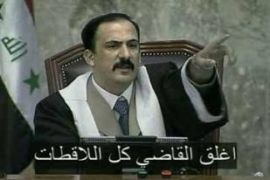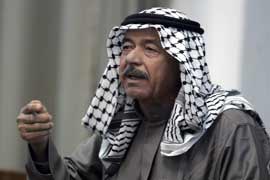Saddam’s Anfal trial reopens
The trial of Saddam Hussein resumes in Baghdad’s fortified Green Zone.

Ezzat, who is a Turkmen Iraqi, said Baghdad airport authorities told him to leave the country because he was not welcome in Iraq. Ezzat appealed to the judge to take action in order to enable the defence team from doing its work.
Sticking to the rules
Chief judge Mohammad al-Khalifa played down Ezzat’s concerns, saying the court does not accept any documents presented by parties other than the defendants representatives.
 |
| Al-Majid is one of Saddam’s cousins and a co-defendant |
Iraq‘s former president, who has already received the death penalty in another trial for his role in the execution of 148 Iraqi Shia villagers after he escaped an assassination attempt in their village in 1982, was last in court on November 8.
Prosecutors say the 1988 Anfal – Spoils of War – campaign against Kurds included widespread use of chemical weapons, killed more than 180,000 people and destroyed hundreds of villages. Saddam and one other defendant face the most serious charge of genocide.
Chief prosecutor Munqith al-Faroon told Reuters on Sunday that he had an audiotape and documents proving Saddam himself ordered the gassing in northern Iraq.
Witness account
The session resumed after a two-week break with a witness describing how Kurdish villagers were taken out into the desert and murdered by soldiers.
“There was a trench there and we were lined up and a soldier was shooting at us,” said Taimor Abdallah Rokhzai, a young Kurd now living in Washington, DC.
“I saw bullets hitting a woman’s head and her brain coming out. I saw the pregnant woman shot and killed,” added Rokhzai, who was 12 at the time.
“It was horrible.”
The seven defendants are accused of responsibility for the deaths of 182,000 Kurds during the Anfal campaign, when government troops swept through Iraqi Kurdistan in 1988, burning and bombing thousands of villages.
Saddam and his former aides argue that it was a legitimate counter-insurgency operation against Kurdish separatists at a time when the country was at war with neighbouring Iran.
The accused – including Saddam’s cousin Ali Hassan al-Majid, known as “Chemical Ali” – all face the death penalty if convicted.